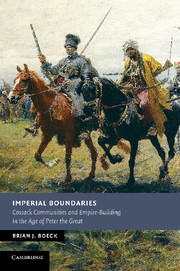Book contents
- Frontmatter
- Contents
- List of maps and illustrations
- Acknowledgments
- List of abbreviations
- 1 The Don region
- 2 The wider world of the Don steppe frontier
- Introduction
- 1 Beyond borders, between worlds: Russian Empire and the making of the Don steppe frontier
- 2 People and power on the frontier: liberty, diversity, and de-centralization in the Don region to 1700
- 3 A middle ground between autonomy and dependence: the raiding economy of the Don steppe frontier to 1700
- 4 Boundaries of integration or exclusion? Migration, mobility, and state sovereignty on the southern frontier to 1700
- 5 Testing the boundaries of imperial alliance: cooperation, negotiation and resistance in the era of Razin (1667–1681)
- 6 Between Rus' and Rossiia: realigning the boundaries of Cossack communities in a time of migration and transition (1681–1695)
- 7 The era of raskol: religion and rebellion (1681–1695)
- 8 Incorporation without integration: the Azov interlude (1695–1711)
- 9 From frontier to borderland: the demarcation of the steppe and the delegitimization of raiding (1696–1710)
- 10 Boundaries of land, liberty, and identity: making the Don region legible to imperial officials (1696–1706)
- 11 The Bulavin uprising: the last stand of the old steppe (1706–1709)
- 12 Reshaping the Don in the imperial image: power, privilege, and patronage in the post-Bulavin era (1708–1739)
- 13 Closing the Cossack community: recording and policing the boundaries of group identity (1708–1739)
- 14 A borderline state of mind: the closing of the Don steppe frontier (1708–1739)
- Afterword
- Index
- References
6 - Between Rus' and Rossiia: realigning the boundaries of Cossack communities in a time of migration and transition (1681–1695)
Published online by Cambridge University Press: 12 January 2010
- Frontmatter
- Contents
- List of maps and illustrations
- Acknowledgments
- List of abbreviations
- 1 The Don region
- 2 The wider world of the Don steppe frontier
- Introduction
- 1 Beyond borders, between worlds: Russian Empire and the making of the Don steppe frontier
- 2 People and power on the frontier: liberty, diversity, and de-centralization in the Don region to 1700
- 3 A middle ground between autonomy and dependence: the raiding economy of the Don steppe frontier to 1700
- 4 Boundaries of integration or exclusion? Migration, mobility, and state sovereignty on the southern frontier to 1700
- 5 Testing the boundaries of imperial alliance: cooperation, negotiation and resistance in the era of Razin (1667–1681)
- 6 Between Rus' and Rossiia: realigning the boundaries of Cossack communities in a time of migration and transition (1681–1695)
- 7 The era of raskol: religion and rebellion (1681–1695)
- 8 Incorporation without integration: the Azov interlude (1695–1711)
- 9 From frontier to borderland: the demarcation of the steppe and the delegitimization of raiding (1696–1710)
- 10 Boundaries of land, liberty, and identity: making the Don region legible to imperial officials (1696–1706)
- 11 The Bulavin uprising: the last stand of the old steppe (1706–1709)
- 12 Reshaping the Don in the imperial image: power, privilege, and patronage in the post-Bulavin era (1708–1739)
- 13 Closing the Cossack community: recording and policing the boundaries of group identity (1708–1739)
- 14 A borderline state of mind: the closing of the Don steppe frontier (1708–1739)
- Afterword
- Index
- References
Summary
In the last two decades of the seventeenth century Russia and Russians represented the top two political problems confronting the Don Host. While the tsars attempted to reign in Cossack raiding, Russian migrants repeatedly pressured for raids in the Cossack krugs. Ataman Frol Minaev navigated the Host through this dangerous period of migration and division. His effective management of converging crises ultimately depended on cultivating the good will of Vasilii Vasilievich Golitsyn, the de facto ruler of Rossiia.
The 1680s were also an important time of social transition for the Don Host. As more Cossacks welcomed women into their settlements and Cossacks' sons began to compete with migrants for scarce resources, Cossack leaders sought to define the parameters of Cossack identity and diminish the role of newcomers in Cossack society. In a period in which more and more Cossacks could trace their ancestral origins to Russia, Don Cossacks started to draw sharper distinctions between themselves and Rus'. New terms of inclusion and exclusion emerged in tandem with efforts to regulate relations between natives and newcomers in the Don region.
MIGRATION FROM RUS' AS A SOURCE OF DIVISION IN THE DON REGION
In the second half of the seventeenth century a great contradiction shaped Cossack society: the promise of freedom from serfdom and taxes lured thousands of Russian migrants to the Don, but the region's limited resource base could not provide sufficient economic opportunities for all who settled there.
- Type
- Chapter
- Information
- Imperial BoundariesCossack Communities and Empire-Building in the Age of Peter the Great, pp. 86 - 102Publisher: Cambridge University PressPrint publication year: 2009



